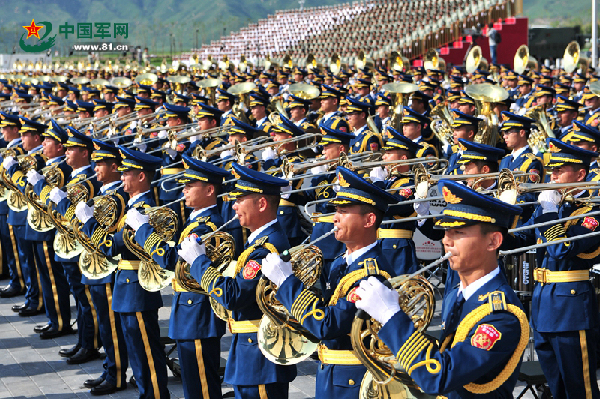Remembering the great sacrifice of the Chinese people
- By James DeShaw Rae
 0 Comment(s)
0 Comment(s) Print
Print E-mail China.org.cn, September 1, 2015
E-mail China.org.cn, September 1, 2015
|
|
|
A nearly 1,300-member PLA military band, which is composed of selected performers from the three armed forces -- army, navy and air force, is scheduled to present a non-stop two-hour show for the Sept 3 military parade marking the 70th anniversary of the end of World War II. The Military Band of the Chinese People's Liberation Army (PLA), which was founded in July 1952, is the only one large wind band in China. It is directly under the General Political Department of the PLA. [www.81.cn] |
If, for China, the 19th century was the era of national humiliation, the first half of the 20th century was the period of even worse national devastation. After the collapse of the Qing Dynasty in 1911, chaos, disorder, and fragmentation characterized most of the next four decades as warlords exerted arbitrary local control and Nationalists and Communists competed for national supremacy.
Enter Japan. The growing militarism, ideological notions of race-based supremacy, and imperial expansionist policies seeking natural resources, contributed to aggressive actions by the Empire of Japan. Across Asia, Japan pursued a new colonialism that encouraged local nationalist movements to throw off Western domination in constructing a Greater East Asia Co-Prosperity Sphere under the banner of "Asia for the Asians."
Likewise, in Europe, Germany was commencing an ideological campaign that combined racial superiority, militarism, and an aggressive foreign policy in an effort at worldwide domination, joining with Italy and Japan to form a Berlin-Rome-Tokyo axis.
This global anti-fascist war, i.e. World War II, began on July 7, 1937 following the Lugouqiao (Marco Polo Bridge) Incident that led to battles between the invading Japanese and China for control of the Beijing-Tianjin and Shanghai areas later that year.
Actually, we could trace the commencement of World War II to Sept. 18, 1931 -- the Mukden Incident when Japanese soldiers of the Kwantung Army fabricated a railway explosion near modern Shenyang to begin demanding territorial concessions from China.
China's political capital of Nanjing would also fall in 1937 in an orgy of murder and rape, nearly two years before the official start of war in Europe in 1939. The last four years of the official WWII saw the cooperation of the Allied powers, France, the Soviet Union, United Kingdom, and United States along with China to combat this grave threat to world peace and security.
After 1940, greater military resistance by Chinese forces in battles and skirmishes against occupying Japanese forces weakened the tide of Japanese advancement across mainland Asia. Occasional cooperation between Chinese Communists and Nationalists, along with growing Soviet and American assistance, finally achieved an end to Japan's brutal military aggression.
On Sept. 2, 1945, Japan formally surrendered to the Allied Forces, including China; September 3 commemorates the first day after the war ended.







Go to Forum >>0 Comment(s)